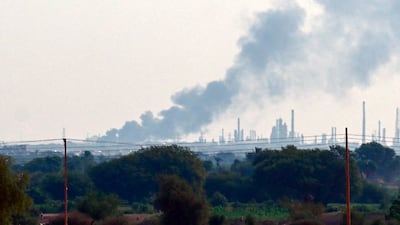Sundanese armed forces troops and allied volunteers were engaged in fierce battles against the Rapid Support Forces paramilitary as they advanced on Wednesday in a two-pronged offensive to retake Bahri, one of three cities comprising the Sudanese capital’s greater region, residents and analysts told The National.
They said RSF fighters were fleeing east from Bahri as the troops and volunteers advanced in opposite directions. They moved south towards the headquarters of the army's Signals Corps and north towards a sprawling and heavily fortified complex housing an oil refinery and a large contingent from the paramilitary.
The refinery in Al Jeely has been controlled by the RSF for more than a year. The paramilitary’s fighters have laid siege to the Signals Corps headquarters since the early days of Sudan’s civil war, which broke out in April 2023.
“This is a crucial battle. It could well be the war's most important battle,” said Sudanese analyst Osman Al Mirghany, who closely monitors the fighting. “The garrison of the Signals Corps has broken the siege and is now fighting its way to rendezvous with the advancing army-led force. The battle in the south could be decided within hours, but snipers from the Rapid Support Forces continue to be a serious menace from their rooftop positions.”

In the opposite direction, the army-led force is closing in on the refinery and surrounding facilities in the northern part of Bahri, Mr Al Mirghany said. There have been as yet unconfirmed reports of fighting inside the complex.
Bahri, Omdurman and Khartoum make up the Sudanese capital, most of which has been under RSF control since shortly after the 21-month war began. The RSF controls most of Omdurman and Khartoum, including the capital’s only international airport, most of the armed forces’ headquarters, the presidential palace and several government ministries and army bases.
The armed forces retook parts of Omdurman last year, mostly in the city’s historical quarter, but has not yet built on those modest battlefield gains to capture more territory in the heavily populated region. Only a small part of Khartoum is under the control of the army.
Wresting back control of Bahri would constitute a major battlefield victory for the army and its commander Gen Abdel Fattah Al Burhan. The battle is taking place weeks after his troops retook the strategically important city of Wad Medani, provincial capital of the farming-rich state of Al Gezira, south of the capital.
Taking back Bahri would place the troops and their allies in a position to launch an offensive on Khartoum. The military-backed administration led by Gen Al Burhan left the city lat year and moved to Port Sudan on the Red Sea, with the RSF taking control of the nation’s traditional seat of power.

The defeat of the RSF in the southern part of Bahri would bring the army to two vital Nile bridges. If seized, that would place the paramilitary-held presidential palace across the Blue Nile in Khartoum and the nearby armed forces’ headquarters within about 500 metres of its southernmost lines.
“The army is in control now of most of Bahri,” Mohammed Taher, who has a home in the city’s district of Al Halfayah, told The National by phone. “The fighting is taking place in the southern part of Bahri amid intense air activity by the army."
Muawiyah Youssef, a local commander of the volunteers fighting alongside the army in Bahri, said those forces were engaged in heavy fighting in Al Safiyah district, 500 metres away from the Signals Corps headquarters.

“Reaching the men from the Corps will give us access to the Blue Nile bridge that leads to the armed forces’ headquarters," he added. "It will also take us to the Maknimer bridge, which allows us to target the presidential palace next, as well as government ministries around it.”
Retired army general Al Moatasem Abdul Qader predicted the armed forces would increase the pressure on the RSF in Bahri, forcing its fighters to flee.
“I think this will happen sooner than later. What comes after will be easy – it’s Khartoum across the Nile,” he said. “The RSF has geographically spread itself too wide and too thin on the ground while losing the goodwill and co-operation of the people because of their transgressions against civilians.”
The RSF, led by Gen Al Burhan’s former ally Gen Mohamed Dagalo, has control over most of the western region of Darfur and parts of Kordofan, in the south-west of the country. Although the group has lost Wad Medani, it controls vast territory in Al Gezira, including the vital, Nile-side city of Hasaheisa, south of the capital.
Tens of thousands have died in Sudan's civil war and more than 10 million have been displaced. About 26 million people – more than half the population – face acute hunger, with famine reported in several parts of the Afro-Arab nation. Repeated attempts by regional and international powers to mediate an end to the war have been unsuccessful.
The army and the RSF have been accused by the UN and rights groups of war crimes. Gen Al Burhan and Gen Dagalo have had sanctions imposed on them by the US over their roles in the conflict.
Al Shafie Ahmed reported from Kampala, Uganda

